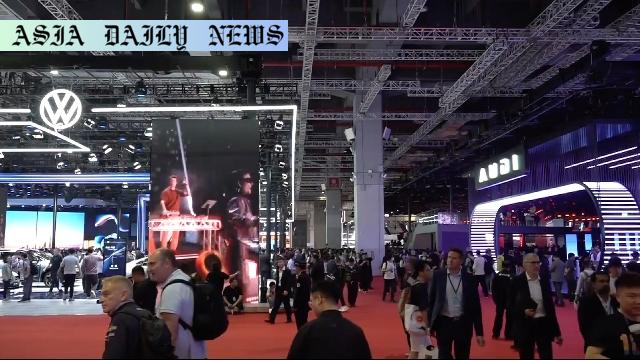EV – Automakers from around the globe showcase groundbreaking electric vehicle technologies amidst US-China trade tensions.
- Automakers worldwide gathered at Auto Shanghai 2025 to showcase EV innovations.
- BYD introduced rapid charging technology with a 400 km range in just 5 minutes.
- Volkswagen and Audi unveiled China-specific EV models to expand their market appeal.
- Japanese automakers like Toyota and Honda announced ambitious EV plans tailored for China.
- Escalating US-China trade tensions have accelerated China’s EV market growth.

Auto Shanghai 2025: A Platform for Global EV Growth
The Auto Shanghai 2025 event has kicked off, with over 1,000 automakers and auto parts manufacturers converging to showcase their latest innovations in electric vehicle (EV) technology and design. This year’s show comes at a pivotal time, with growing economic uncertainties and escalating trade tensions between China and the United States casting a shadow over the global automotive industry. Nevertheless, the event underscores the resilience of the industry and highlights China’s growing dominance in the EV sector, which remains the world’s largest auto market.
One of the standout features of Auto Shanghai 2025 is the unveiling of groundbreaking EV innovations. China’s top EV maker, BYD, demonstrated its latest rapid-charging technology, capable of delivering a 400-kilometer driving range within just five minutes. This development represents a major leap in pushing the boundaries of EV efficiency and convenience, aligning with the nation’s focus on sustainable and energy-saving technologies. With domestic manufacturers like BYD leading the way, China continues to fortify its position as a frontrunner in the global EV market.
Global Automakers Tap Into China’s EV Boom
Foreign automakers are also making ambitious strides to capitalize on China’s growing EV demand. German automaker Volkswagen unveiled a series of concept EV models specifically tailored for the Chinese market, aiming to cater to local preferences. Volkswagen’s subsidiary, Audi, revealed its sleek, sports-type EV under a new China-centric brand, further emphasizing the importance of localization in penetrating the competitive Chinese market.
Japanese vehicle manufacturers, such as Toyota and Honda, made significant announcements as well. Toyota revealed plans to establish an EV manufacturing plant in Shanghai, an initiative aimed at strengthening the presence of its luxury car brands. Meanwhile, Honda showcased EV models integrated with AI technologies from Chinese startup DeepSeek, which reflects their focus on innovation and adaptation to evolving customer trends within China. The strategic partnerships and tailored models underscore the extent to which global brands are investing in meeting the unique demands of this market.
China’s EV Market Surges Amid US Trade Tensions
The EV boom in China is closely tied to the trade landscape and domestic policies. Following the imposition of tariffs by the Trump administration, China has focused on self-reliance and bolstering its domestic EV infrastructure. This has resulted in a surge of government support for EVs and other new energy vehicles, driving extraordinary growth in sales and fostering an increasingly dynamic automotive ecosystem. As such, Automakers are finding new opportunities to expand and innovate as China continues to dominate the global EV landscape.
In conclusion, Auto Shanghai 2025 exemplifies the transformative potential and market momentum within the EV sector. Automakers worldwide are leveraging this opportunity to showcase cutting-edge technologies, emphasizing the global shift towards sustainable mobility. Amid rising trade tensions, the event serves as a timely reminder of the resilience and adaptability of the automotive industry in meeting global challenges head-on.



Commentary
China’s Role in Shaping the Future of EVs
The Shanghai Auto Show highlights China’s immense influence in defining the trajectory of the global EV market. As the country with the largest number of EV buyers, China represents a crucial battleground for automakers worldwide. The innovations showcased during the Auto Shanghai 2025 event, particularly BYD’s rapid-charging technology, exemplify the impressive strides domestic manufacturers are making to stay ahead in this competitive space. This development will surely put additional pressure on international contenders to innovate at a faster pace while catching up on efficiency and convenience benchmarks.
Moreover, the participation of industry giants like Volkswagen, Toyota, and Honda reveals the lengths to which non-Chinese automakers are willing to go to secure a foothold in this vital market. Whether it is the locally-adapted concept cars unveiled by Volkswagen or the integration of artificial intelligence in Honda’s EVs, it is evident that foreign brands are investing heavily in appealing to Chinese consumers. However, this also raises intriguing questions about whether these companies can compete effectively with the ingenuity and cost efficiency of Chinese manufacturers already dominating the market.
The US-China Trade Tensions: Catalyst or Challenge?
The broader backdrop of US-China trade tensions adds complexity to the event’s narrative. While barriers such as tariffs aim to protect domestic industries in the United States, they have inadvertently motivated China to double down on developing its own EV manufacturing capabilities. As a result, the country now possesses an edge that would have been unimaginable a decade ago. It will be interesting to observe how trade dynamics influence global EV adoption trends and whether new trade agreements could reshape this competitive landscape.
In the end, Auto Shanghai 2025 not only showcases technological evolution but also serves as an economic and strategic inflection point for the automotive industry. Global automakers and domestic players alike will need to navigate increasingly intricate market dynamics, leveraging innovation and adaptability to thrive in the world’s most influential automotive market.